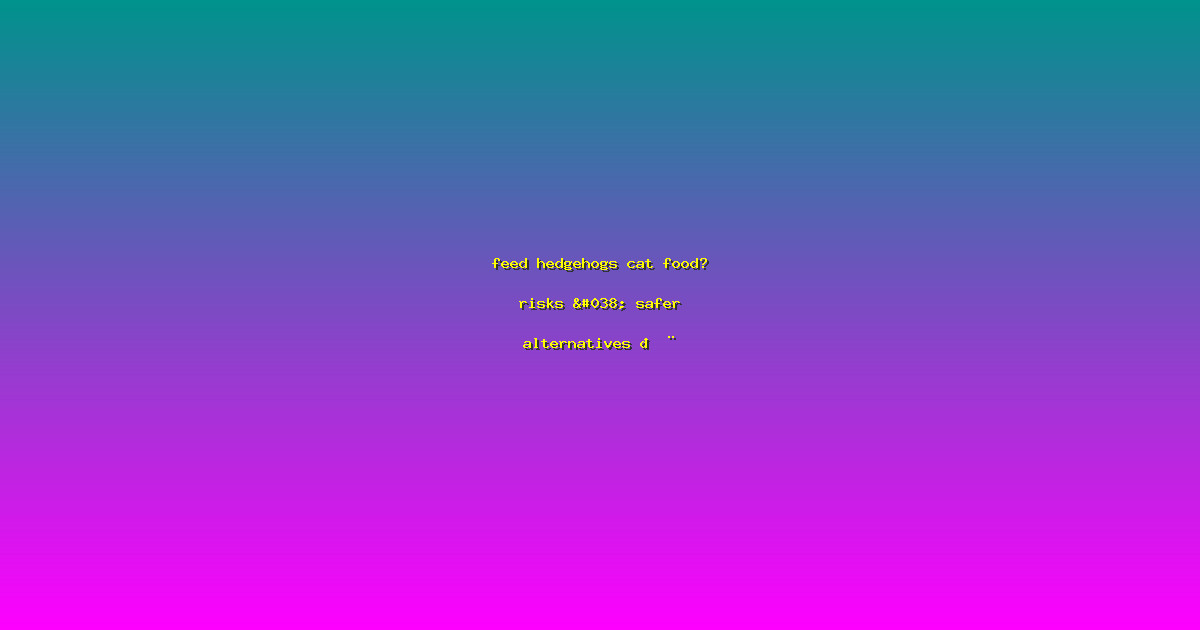feed hedgehogs cat food? risks & safer alternatives 🚨
As a pet owner, you want to provide the best care for your hedgehog. But have you ever considered feeding your hedgehog cat food? While it might seem like a convenient option, feeding hedgehogs cat food can pose significant risks to their health. In this article, we’ll explore the dangers of using cat food as a primary diet and offer safer alternatives to ensure your pet’s well-being. Let’s dive into the facts and find out how to keep your hedgehog happy and healthy.
The Risks of Feeding Hedgehogs Cat Food
Feeding hedgehogs cat food can lead to several health issues. Hedgehogs have unique dietary needs that differ from those of cats. Here are some of the key risks:
- Nutritional Imbalance: Cat food is formulated to meet the nutritional requirements of cats, which are different from those of hedgehogs. Hedgehogs require a diet that is higher in protein and lower in fat compared to cat food. This imbalance can lead to obesity, kidney problems, and other health issues.
- High Fat Content: Many cat foods are high in fat, which can cause obesity and fatty liver disease in hedgehogs. According to a study by the Journal of Exotic Pet Medicine, hedgehogs fed a high-fat diet are at a higher risk of developing these conditions.
- Excessive Protein: While hedgehogs need a high-protein diet, cat food often contains more protein than necessary. Excessive protein can put a strain on their kidneys and lead to kidney failure over time.
Safer Alternatives to Cat Food
Instead of feeding your hedgehog cat food, there are several safer alternatives that can meet their nutritional needs. Here are some options:
- Commercial Hedgehog Food: Many pet stores now offer specialized hedgehog food that is formulated to meet their unique dietary requirements. These foods are typically lower in fat and higher in protein, making them a safer choice.
- Insects: Hedgehogs are insectivores, and insects like mealworms, crickets, and waxworms can be a great source of protein. These insects can be purchased from pet stores or online and should be offered in moderation.
- Fruits and Vegetables: While hedgehogs are primarily insectivores, they can also benefit from small amounts of fruits and vegetables. Offer items like apples, bananas, and carrots in small quantities to supplement their diet.
Creating a Balanced Diet for Your Hedgehog
Creating a balanced diet for your hedgehog involves a combination of commercial hedgehog food, insects, and occasional fruits and vegetables. Here’s how you can do it:
- Commercial Hedgehog Food: This should form the base of your hedgehog’s diet. Look for brands that are specifically formulated for hedgehogs and contain a balanced mix of protein, fat, and other essential nutrients.
- Insects: Offer insects like mealworms and crickets a few times a week. These can be dusted with a calcium supplement to ensure your hedgehog gets the necessary minerals.
- Fruits and Vegetables: While not a primary food source, fruits and vegetables can be offered as occasional treats. Make sure to wash them thoroughly and remove any seeds or pits before feeding.
Frequently Asked Questions
Can I feed my hedgehog cat food occasionally?
While it might be tempting to give your hedgehog a small amount of cat food as a treat, it’s best to avoid it altogether. Even occasional feeding can lead to nutritional imbalances and health issues over time. Instead, opt for safer alternatives like commercial hedgehog food or insects.
What are the signs of nutritional deficiencies in hedgehogs?
Signs of nutritional deficiencies in hedgehogs can include lethargy, poor coat condition, weight loss, and decreased appetite. If you notice any of these symptoms, consult a veterinarian who specializes in exotic pets to ensure your hedgehog receives the proper care.
How often should I feed my hedgehog?
Hedgehogs should be fed a small amount of food daily. A good rule of thumb is to provide about 1-2 tablespoons of commercial hedgehog food per day, supplemented with insects a few times a week. Monitor your hedgehog’s weight and adjust the amount of food accordingly.
Is it safe to feed my hedgehog human food?
While some human foods can be safe for hedgehogs, it’s important to be cautious. Avoid feeding your hedgehog foods high in sugar, salt, or fat. Safe options include small amounts of fruits like apples and bananas, but always consult with a veterinarian before introducing new foods.
What are the long-term effects of feeding hedgehogs cat food?
Feeding hedgehogs cat food over the long term can lead to serious health issues such as obesity, kidney problems, and fatty liver disease. These conditions can significantly reduce your hedgehog’s lifespan and quality of life. It’s crucial to provide a diet that meets their specific nutritional needs.
Conclusion
Feeding hedgehogs cat food can pose significant risks to their health, including nutritional imbalances and long-term health issues. By opting for safer alternatives like commercial hedgehog food, insects, and occasional fruits and vegetables, you can ensure your pet remains healthy and happy. Remember, a balanced diet is key to your hedgehog’s well-being. Consult with a veterinarian specializing in exotic pets to create a diet plan that meets your hedgehog’s unique needs. By making informed choices, you can provide the best care for your beloved pet.

